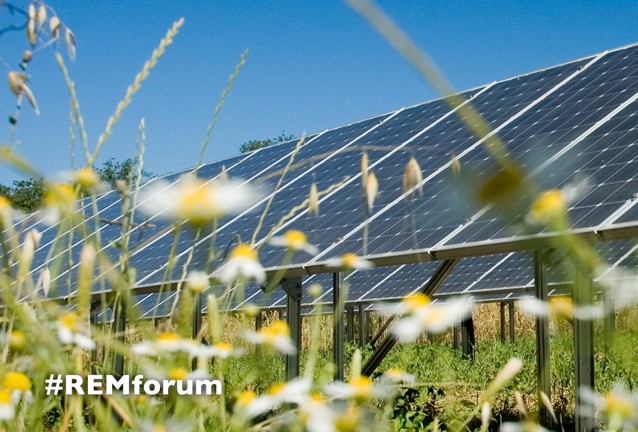Programme 2023
(as of June 22, 2023)
- June 22, 2023: 2nd CircuBAT Research Meeting (by invitation only)
- June 22, 2023: #REMforum Pre-Conference Dinner with Keynote
- June 23, 2023: #REMforum Conference Day
"After the winter: Accelerating the climate crisis or supercharging the energy transition?"
Thursday, June 22, 2023
18:30 Pre-Conference Dinner with Keynote
Winning Hearts & Minds for Climate Action - Lessons learned from the latest Swiss Climate Vote
- Sophie Fürst CEO & Co-campaign manager, Swiss Association of Climate Protection (Verein Klimaschutz Schweiz), CH
- Marcel Hänggi Research associate, Swiss Association of Climate Protection (Verein Klimaschutz Schweiz) CH
Moderator: Prof. Dr. Patrick Emmenegger Public Policy and Comparative Political Economy, School of Economics and Political Science, University of St.Gallen (HSG), CH
Location: Restaurant "Lagerhaus", Davidstr. 42, 9000 St.Gallen restaurantlagerhaus.ch
Friday, June 23, 2023
08:15 Registration
(*) Speakers contribute online
Moderator: Dr. Melinda Crane Chief political correspondent, Deutsche Welle TV, DE
09:00 Introduction to #REMforum 2023
Prof. Dr. Rolf Wüstenhagen Chair of Management of Renewable Energies, University of St.Gallen
09.15 Build back greener – Why Renewables are Key in overcoming Crises
- Deputy Minister Yaroslav Demchenkov Ministry of Energy of Ukraine, UA (*)
09:45 Is 1.5°C still possible – Insights from IRENA’s World Energy Transitions Outlook
Dr. Ute Collier Deputy Director, Knowledge Policy and Finance Centre, International Renewable Energy Agency (IRENA), AE
10:15 Panel Discussion I.
The Energy World at a Crossroads – where do we go from here?
- Kai Buntrock Managing Director, Autarq GmbH, DE
- Monika De Volder Policy Officer, European Commission (DG Energy), BE (*)
- Walburga Hemetsberger CEO, SolarPower Europe, BE (*)
- Dr. Frank Rutschmann Head Renewable Energies, Swiss Federal Office of Energy, CH
11:00 Coffee Break
11:30 Panel Discussion II.
Power to the people – can community energy SUPERCHARGE the transition?
- Simon Berthoud Campaign Coordinator, AG!SSONS (Let’s act!), CH
- Julia le Maitre Researcher, Environmental Research Institute, Cork University Business School, IE
- Aurel Schmid CEO, Solarify, CH
12:15 Lunch
13:30 - 15:30 Parallel Workshops A - D
Workshop A (in German)
FEELS LIKE A BARGAIN? EMOTIONS AND CONSUMER ADOPTION
- Julia Loder University of St.Gallen (workshop leader)
- Angelika Bachmann bachmann-education, Glonn, DE
- Christoph Kauz Managing Director, Energietal Toggenburg, CH
- Martin Schweighofer Energieinstitut Vorarlberg, AT
The current energy crisis evokes strong emotions. Reliability and climate concerns intermingle and leave consumers facing the question where their energy should come from. Demand for renewable energy technologies (RET) has surged in light of the crisis. This workshop will discuss the role of emotions in consumer adoption of RETs, here solar PV, heat pumps, and electric vehicles. Particularly, the link between affective and rational factors and how they affect whether consumers adopt RETs is in the focus of this workshop. Professionals shaping the energy transition in Switzerland, Austria, and Germany will share their insights on the topic. After a presentation of findings from recent consumer surveys conducted in Germany and Switzerland, we will discuss their implications for renewable energy managers and policymakers.
Workshop B
CLOSING THE LOOP OF EV BATTERIES
- Juliane Seika University of St.Gallen (workshop leader)
- Prof. Dr. Merla Kubli University of St.Gallen (workshop leader)
- Alessandra Hool CEO & Managing Director, ESM Entwicklungsfonds Seltene Metalle, CH
- Jodok Reinhardt Founder & CEO, LIBREC AG, CH
- Alexandru Zavate MBA candidate & CFO Mondaine Watch Group, CH
- Lukas Zeugin MBA candidate & Strategic Project Manager, Biotronik, CH
Establishing a circular economy for used EV batteries is a key strategy for implementing a sustainable mobility system. While lacking the necessary volumes and incentives today, a circular economy promises business opportunities by extending the material's lifetime, offering storage for the energy market, and decreasing the environmental footprint of EV batteries. This workshop illuminates the road toward a circular economy of EV batteries in three ways. Guest inputs will shed light on current entrepreneurial activity in the repurposing and recycling market. Insights on regulatory developments on the EU level highlight the relevance of the political perspective. Furthermore, the initiative of a battery passport will be introduced, which translates EU policies into practice by leveraging information flows across the value chain. The second part of the workshop is dedicated to an interactive session where participants discuss the insights gained by engaging in a case study.
Workshop C
A GREEN DEAL FOR UKRAINE AND SWITZERLAND: THE ROLE OF COMMUNITY PARTICIPATION
- Prof. Dr. Nadiya Kostyuchenko Sumy State University & University of St.Gallen (workshop leader)
- Katharina Reidl University of St.Gallen (workshop leader)
- Anna Ackermann Policy Analyst, International Institute for Sustainable Development (IISD) & Board Member, Centre for Environmental Initiatives (Ecoaction), CH
- Katja Graf Senior Scientific Officer, Office for Nature and Environment, Canton of Grisons, CH
- Franziska Ryser National Councillor, Federal Assembly of the Swiss Parliament, CH
Green Deals have recently been established in several countries to reach the 1.5°C global warming target. They are usually adopted on a national or supranational level, as in the case of the European Green Deal, and follow a top-down approach of policy making. Given the crucial role of social acceptance of Green Deals, bottom-up citizen co-investment and community participation are equally important for a successful energy and climate policy implementation. With the war in Ukraine, countries have put more emphasis on a rapid energy transition. Green Deals offer a solution to not only become more energy independent, but also to put climate policies in place. This workshop introduces centralised and decentralised Green Deal policy designs and emphasises the role of citizen participation in climate and energy policy implementation.
Workshop D
SUPERCHARGING THE ENERGY TRANSITION WITH CORPORATE NET ZERO STRATEGY
- Sabrina Mili University of St.Gallen (workshop leader)
- Dr. Cris Pons-Seres de Brauwer University of St.Gallen (workshop leader)
- Simon Heller Director Sustainability Services, Deloitte. AG, CH
- Elisa Sadakhom Operational Sustainability Consultant, Property & Sustainability, Group Technology & Operations (GTO), Zurich Insurance Company Ltd., CH
- Roland Stadler Head Energy Procurement, Migros-Genossenschafts-Bund, CH
Renewable energy is key in achieving ambitious corporate net zero targets. But how can green power procurement strategies be designed to actually make a difference in accelerating the energy transition? The workshop will kick-start with an overview of the state-of-the-art of green power procurement, as well as of the challenges associated with their implementation. This will be followed by best practice cases of companies switching to 100% renewables and lead to a discussion of effective green power strategies to deliver on corporate net zero targets.
15:30 Coffee break
16:00 Panel Discussion III.
Alpine Renewables: finding a Balance between Power Generation and Nature Conservation
Moderator: Dr. Melinda Crane Chief political correspondent, Deutsche Welle TV
- Prof. Dr. Gabriella De Maio Professor of Energy Law at University Federico II, Coordinator of the Italian Forum of Energy Communities, Member of the Scientific Committee of the Energy City Hall (Magliano Alpi REC), IT
- Claudio Föhn Head of Sustainability Arosa 2030, Arosa Tourismus, CH
- Prof. Dr. Michael Lehning Professor at EPFL & Academic Director, CLIMACT, CH
- Xavier Sinnhuber Head, New Renewables Energy Sources Switzerland, Alpiq, CH
16:45 Closing Remarks
- Prof. Dr. Rolf Wüstenhagen Chair of Management of Renewable Energies, University of St.Gallen
17:00 Apéro

